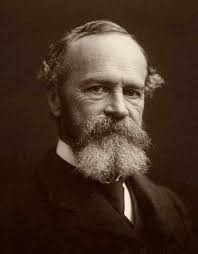James, William

Bio: (1842-1910) American philosopher. William James studied medicine at Harvard University, where he later taught anatomy and psychology. Within the scientific field of psychology, his most important book is The Principles of Psychology (1890). In this field, his contributions to the theory of emotions; the view of human consciousness, which he called "radical empiricism"; his view on human voluntary movements; and his theory of self are most significant. Within the theory of emotions, he stated that emotions occur after a psychological stimulus. His famous explanation of this view is: "we feel sorry because we cry, angry because we strike, afraid because we tremble, and not that we cry, strike, or tremble, because we are sorry, angry, or fearful, as the case may be" (1890).
Radical empiricism represents the view of human consciousness as a constant flow of undefined data from which the mind selects specific details, in accordance with personal interests, needs, or focus. Influenced by Darwin's evolutionism James adopted the view that our behavior and voluntary movements are directed by primary organic functions like innate instincts and reflex action.
James developed a complex theory of self. He divides the self into two categories, which he calls "Me" and "I". Me refers to a case where a person describes their own personal experiences; while the I refers to the self-conscious or thinking self. The I represents the mind or pure ego. James further divides Me into three selves: the material self, the social self, and the spiritual self.
In the field of philosophy and epistemology, he was an advocate of pragmatism. Along with Charles Sanders Peirce and John Dewey, James is the founder of pragmatism. In his book Pragmatism (1907) James sees pragmatist epistemology as starting from the assumption that theories should be judged based on their practical consequences, that is, whether they can bring any real benefit, and if they cannot, they should be rejected. Pragmatism states that truth can never be absolute, because it can always change, due to new knowledge or attitudes.
In The Varieties of Religious Experience (1902), James outlines a fundamental distinction between institutional religion and personal religion. Institutional religion is ritualistic, organized, regulative, corporative, exterior, theological, established, and ecclesiastic. Personal religion deals with the conscience, interiority, sentiment, non-ritual, individuality, the human dimension, mysticism, experience, and a direct connection between souls, between humans and their god. He argues that the focus of scientific research on religion should be on psychological religious experience, not religious institutions. He defined religion in a narrower sense and created a basis for the comparative study of religion.
James also studied the influence of individuals in history in his essay "Great Men, Great Thoughts, and the Environment", published in the Atlantic Monthly in 1880. He compares great men (geniuses) with animal species in ecology. Just as a new species introduce great changes in the ecological balance, so great people change previously existing social relations and transform them, thus changing the course of history.
Theoretical approaches
PragmatismMain works
The Principles of Psychology (1890);
The Will to Believe (1897);
The Varieties of Religious Experience (1902);
Pragmatism: A New Name for Some Old Ways of Thinking (1907);
Essays in Radical Empiricism (1912).

